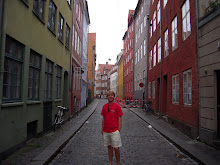Monday, January 19, 2009
Cinema Paradiso & Classic Hollywood Cinema
One of the things that struck me the most about David Bordwell’s Classic Hollywood Cinema was the definition of the “Hollywood formula” for screenplays. Bordwell writes: “the plot consists of an undisturbed stage, the disturbance, the struggle, and the elimination of the disturbance.” In this day and age of cinema, it is incredible to see how much screenplays have advanced and changed, and how films bend these once rigid rules. Screenplay writing, like every active medium, is incredibly adaptable. People get bored with the wooden, formulaic screenplays and ask for more challenging narratives. The movies today (as exemplified by Fight Club and Amelie) are clear and set examples of rule-defying narratives. However, a screenplay can be challenging and classic at the same time. Cinema Paradiso is just that. It immediately defies the traditional outline for the Hollywood screenplay (it spends essentially no time exploring the “undisturbed stage” of our protagonist and jumps immediately into the disturbance, requiring a change both in time and setting). Salvatore, our protagonist, comes home to the news that his old friend Alfredo has died. Salvatore has not been home in thirty years, but his mother, who called with the news, is sure that he will return for the funeral. In order to establish the narrative, the film must jump backwards to Salvatore’s childhood. The disturbance is clear: Salvatore’s mother calls and her news brings Salvatore back to his hometown and forces him to remember all that his childhood meant to him. But what exactly is Salvatore’s struggle? Is it a simple return home, to make things right with his mother and to honor his past with Alfredo? Is it to reconnect with his childhood love, Elena? Perhaps it is larger than that, more of an identity struggle he must endure. Is Salvatore being forced to mesh together the identity he created as a child (which, as the spectator finds outs, mainly deals with his obsession with films, especially the racier clips that are cut out), with his current, successful and professional one? It is most likely a combination of the three, with emphasis on the third definition. Cinema Paradiso plays with the effects of film on identity. It follows a film-obsessed child and how the romance of the cinema, the community togetherness of the theater, shaped and created his identity. Toto (Salvatore’s name when he was younger) lives his life as it was a film. His romance with Elena is most strongly expressed when Salvatore, as a young teenager, films her with his camera and, later on, when he dramatically embraces her in the rain. Both are cinematic moments, and the young Salvatore frames them in terms of cinema and film, rather than in more personal terms. But is the disturbance finally eliminated at the end of the film? The final sequence, the montage of the racy clips that Alfredo compiled and put together in a film reel for Salvatore, truly brings everything together. It is a compilation of what drove Toto into the film world as a child. It is brought together in a single reel, and also is evidence that Alfredo, even though he told Salvatore never to return to his hometown, knew that Salvatore would do just that. He would return home, he would honor his childhood and his infatuation with the cinema, he would wrap together his identities into one.
Monday, January 12, 2009
How does film in general affect the way you see the world?
In Walter Benjamin's "The Work of Art in the Age of Mechanical Reproduction", Benjamin quotes Severin-Mars as saying: "film might represent an incomparable means of expression". Though this statement might seem incredibly bold, after watching "Amelie" and "Fight Club", the claim seems legitimate. These two films stretch the boundaries of film itself and show how much one can actually do within the medium. Benjamin talks at length about the future possibilities of film, and he would be happy to see the advances made as evidenced by these works. In "Amelie" for example, the power of the imagination is so fully and gloriously expressed throughout the film. Amelie's desk lamp comes alive, and clips of lovers across the city of Paris climaxing are shown as Amelie ponders the question on her roof. In "Fight Club", the infusion of the character of the Narrator and the influence of his alter-ego Tyler Durdan are expertly shown and thematically expressed using techniques that only film could capture. Blips of Tyler appear every so often on the screen before he actually appears in a seemingly human manifestation. In what other medium could a mental creation of an alter-ego be so powerfully expressed? When Tyler is revealed to be just that, a figment of the narrator's imagination (or, arguably, his actual self), Fincher returns to previous clips (now devoid of Brad Pitt's Tyler) and reveals to the audience how he had tricked them and how it all makes sense. Both these films expertly exploit the technological advances of the day and use them to reinforce the core narratives of their stories.
Subscribe to:
Posts (Atom)
